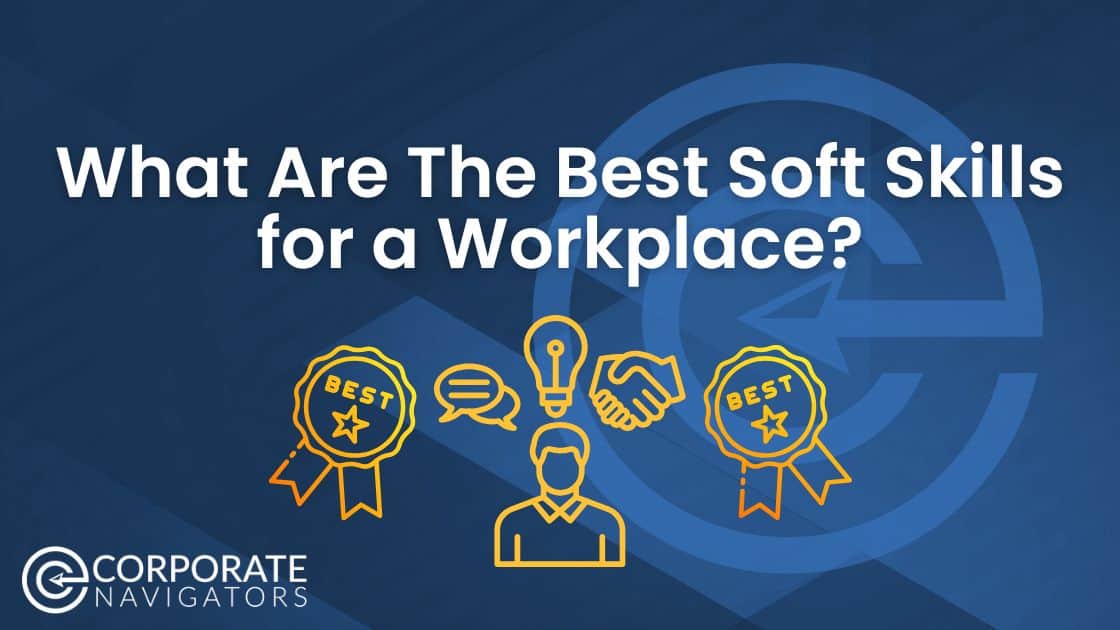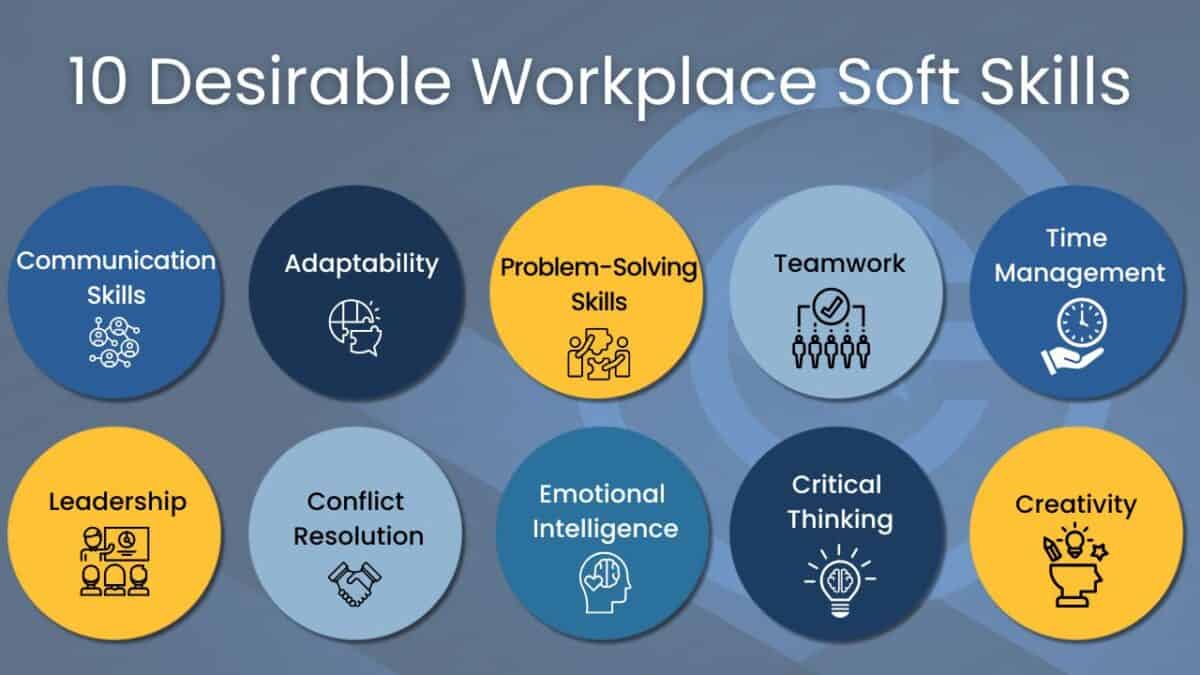
Table of Contents
The Best Workplace Soft Skills for Professionals
Hard skills and soft skills are two distinct categories of abilities that play important roles in the workplace. While hard skills (aka technical skills) are measurable, job-specific abilities, soft skills are interpersonal traits or behavioral characteristics that relate to a person’s ability to work effectively with others and adapt to various situations. Important soft skills include communication prowess, teamwork, adaptability, and problem-solving, which are transferable across different jobs and industries.
If you need to identify candidates with the right set of hard and soft skills for an open role, Corporate Navigators can help you. We can identify candidates with the technical skills you need through Recruiting Research and then screen them for soft skills during Candidate Sourcing.
10 Best Soft Skills for the Workplace
1. Communication Skills
Communication is key in a collaborative workplace. Knowing how to effectively convey your ideas in a professional and respectful manner is a highly valuable interpersonal skill. This skill is essential for providing feedback and ensuring everyone is aligned with the team’s goals. It also helps to avoid misunderstandings, foster collaboration, and maintain transparency within an organization. Strong communicators can bridge gaps between teams and different levels of management, improving overall workflow and decision-making.
2. Adaptability
Being adaptable is absolutely necessary, especially in dynamic industries. This means means staying flexible in the face of changes and challenges which inevitably will occur. In today’s fast-paced work environments, businesses need employees who can shift priorities quickly, learn new skills, and stay calm under pressure. This skill is particularly useful in industries that evolve rapidly, like retail and marketing where the ability to pivot can determine an organization’s ability to thrive.
3. Problem-Solving Skills
Problem-solving is the ability to analyze a situation, identify potential solutions, and implement a plan of action. It requires a fair dose of active listening while synthesizing potential answers to the issues at hand.
This skill allows individuals to face obstacles creatively and come up with practical solutions, making the candidate invaluable team members. In the workplace, strong problem solvers can resolve conflicts, streamline processes, and continuously improve organizational operations. Therefore, in the job market, finding a problem solver is a major positive.

4. Teamwork
In the job search, there are many positions that require cooperation with co-workers. Teamwork involves working collaboratively with others to achieve a common goal. It requires empathy, mutual respect, and the willingness to contribute towards a shared purpose, often with diverse perspectives and skills.
Being a team player is absolutely necessary for long-term growth, which makes strong people skills an invaluable asset that transcends industries. Effective teamwork also improves morale, fosters creativity, and ensures that tasks are completed more efficiently.
5. Time Management
It’s amazing how simple things like time management skills can differentiate a mediocre candidate from a great one. Effectively prioritizing one’s time ensures that an employee’s skill set is used to the full throughout the work day.
The ability to meet deadlines, and use time efficiently to achieve goals is an essential soft skill that no recruiter should overlook. With strong time management, employees are more productive and can juggle multiple responsibilities without feeling overwhelmed. This skill is crucial in maintaining a healthy work-life balance and ensuring that projects are delivered on time and within budget.
6. Leadership
Another soft skill that defines a great employee is leadership. This involves motivating, guiding, and inspiring a team to reach its goals. Effective leaders foster trust, encourage personal and professional development, and lead by example.
Strong leadership also promotes a positive work culture, drives productivity, issues constructive feedback, hones the best of their team’s strengths, and helps to retain top talent within an organization.
7. Conflict Resolution
Every Human Resources professional knows that wherever people congregate for an extended period of time, conflict is bound to occur. Instead of ignoring its presence (and losing good people from ignoring issues), establishing leaders with excellent conflict resolution skills can save your company from an elevated attrition level.
Specifically, conflict resolution is the ability to address and resolve disagreements in a constructive manner. It helps to maintain a positive and productive work environment by preventing issues from escalating and affecting team morale. Professionals who excel in conflict resolution contribute to stronger, more cohesive teams and improve interpersonal relationships within the workplace.
8. Emotional Intelligence
Emotional intelligence (EQ) is not mentioned in typical job descriptions but is a strong plus for any candidate. The ability to recognize, understand, and manage your emotions, as well as empathize with others. It enables individuals to navigate social complexities, build strong relationships, and handle stressful situations effectively. High EQ helps in creating a supportive work environment and fosters strong interpersonal dynamics across teams.
But EQ isn’t just about self-control during stressful meetings or staying calm when the printer jams for the third time in a row. It’s also about:
- Self-Reflection: Taking the time to learn from past mistakes and adjust your approach moving forward.
- Perspective-Taking: Seeing things from someone else’s point of view, which is essential for collaboration and conflict resolution.
- Teamwork: Collaborating effectively with others by understanding and valuing different emotions and perspectives.
- Relationship-Building: Establishing strong, trusting relationships with coworkers, clients, and supervisors.
- Customer Service: Addressing the needs of clients or customers with empathy and genuine care.
When employees demonstrate emotional intelligence and empathy, it creates a ripple effect—improving morale, enhancing communication, and contributing to a more positive, productive workplace overall.
9. Critical Thinking
Critical thinking is the ability to objectively analyze and evaluate information, form reasoned conclusions, and make decisions based on evidence. It allows employees to assess problems from multiple angles, anticipate potential risks, and make well-informed decisions. In the workplace, critical thinkers improve innovation, streamline processes, and contribute to the strategic direction of the organization.
10. Creativity
Creativity is the ability to think outside the box, generate novel ideas, and find innovative solutions to problems. Creative thinkers bring fresh perspectives, drive innovation, and contribute to problem-solving in ways that others may not envision. In the workplace, creativity fosters a dynamic, forward-thinking culture and helps companies stay competitive in changing markets.
Soft Skills vs. Hard Skills/Technical Skills
Hard skills are job-specific abilities that can be measured and directly applied to fulfill a job’s essential responsibilties. Meanwhile, soft skills are often less tangible and can be challenging to quantify, but they are crucial for success in almost any role, especially in leadership, customer-facing positions, and team-based environments.
Examples of hard skills include programming languages, database management, and statistical analysis. While soft skills are often gained through practice and Employees can acquire hard skills through various methods like formal education, hands-on experience, certifications, mentorship experiences, professional development courses, self-paced learning, and joining professional communities.
Every employee can effectively develop and enhance their soft and hard skills to meet the demands of their current roles or prepare for future career opportunities. Whether these soft skills come naturally or have been built up over time, they’re a powerful way to make a memorable impression in any professional setting.
Cultivating a strong set of soft skills—and continuing to nurture them throughout your career—pays off in any industry or position. The good news is, you don’t have to master everything at once. With the flexibility of online learning, self-paced courses, mentorship, and on-the-job experience, you can steadily grow these skills in ways that fit your schedule and responsibilities.
No matter your starting point, investing in your own growth ensures you’re always ready for new challenges and opportunities.
Soft Skills vs. Functions
Functions are tasks or duties that an individual is responsible for in their job role. They are often technical and job-specific, focusing on the actual work or processes that need to be completed within an organization. They are generally related to the knowledge, skills, and abilities required for the job itself.
Examples of functions include:
- Accounting (managing financial records, bookkeeping)
- Software development (writing code, testing applications)
- Marketing (creating campaigns, analyzing market trends)
- Sales (closing deals, customer prospecting)
- Project management (planning, resource allocation)
- Customer service (handling inquiries, troubleshooting issues)
Functions are measurable and are typically tied to the specific outcomes expected from a role. They’re usually learned through formal education, training, and experience.
How to Demonstrate Soft Skills
Showcasing your competency in specific soft skills can feel a bit abstract compared to listing software proficiencies or certifications. However, there are several practical ways to make these vital abilities tangible on your resume or during an interview.
One growing trend is earning digital skill badges or micro-credentials through platforms such as Coursera, LinkedIn Learning, or Credly. By completing coursework or assessments in areas like teamwork, leadership, or communication, you can earn shareable badges that act as verifiable proof of your abilities.
In addition, participating in real-world projects, joining professional organizations, or volunteering for leadership roles are great strategies. Document these experiences by:
- Including success stories or brief anecdotes in your resume’s accomplishments section, explaining how you resolved conflicts, managed your time, or solved a challenging problem.
- Requesting recommendations on LinkedIn that highlight your soft skills from colleagues, supervisors, or mentors.
- Presenting relevant feedback or awards from peers or employers that speak directly to your people skills or adaptability.
Bringing these achievements forward not only differentiates you, but also provides hiring managers with clear, concrete examples of your capabilities.
Mental Agility: Desirable Another Soft Skill
Mental agility refers to the ability to think on your feet and adjust quickly in ever-changing circumstances. In a workplace setting, this means you can handle shifting priorities, unexpected problems, or complex projects without losing momentum. Teams benefit from mentally agile members who are open to new approaches, stay inquisitive, and respond positively when things don’t go as planned.
Employees who demonstrate mental agility are adept at:
- Navigating unfamiliar situations with confidence
- Meeting goals and deadlines even when conditions aren’t perfect
- Making sound decisions when time is tight
- Switching between tasks and responsibilities smoothly
- Remaining focused on key objectives despite distractions
Ultimately, mental agility equips you to not only embrace change but thrive in it—ensuring your contributions remain valuable no matter how the landscape shifts.
The Best Soft Skills for the Workplace
As you can see, the importance of soft skills in the professional world cannot be overstated. While hard skills are crucial for performing specific job functions, soft skills are the intangible qualities that enable individuals to excel in their roles, collaborate effectively, and contribute to a positive work environment.
The ten soft skills discussed in this article – communication, adaptability, problem-solving, teamwork, time management, leadership, conflict resolution, emotional intelligence, critical thinking, and creativity – are essential for success across various industries and positions. By developing and honing these skills, professionals can enhance their career prospects, improve workplace relationships, and drive organizational success.
Showcasing and Measuring Soft Skills
While soft skills can sometimes feel elusive or difficult to quantify, there are now more ways than ever to demonstrate competency in these areas. For example, professionals can earn skill badges or micro-credentials by showcasing their abilities in areas like oral communication or decision making. These credentials not only help individuals track and evaluate their progress in skills that are traditionally challenging to measure, but also provide a tangible way to differentiate their résumés and highlight their achievements to employers.
As the job market continues to evolve, those who possess a strong combination of both hard and soft skills will be best positioned to thrive in their careers and adapt to the changing demands of the modern workplace.


